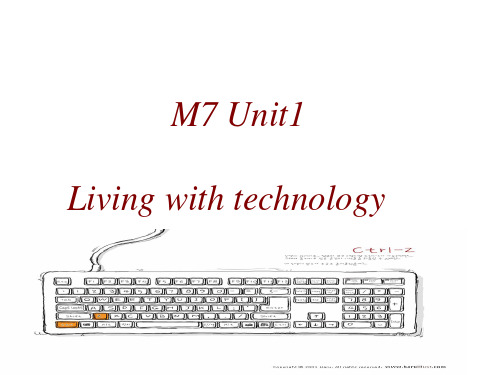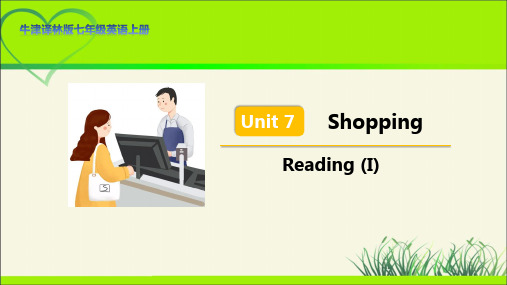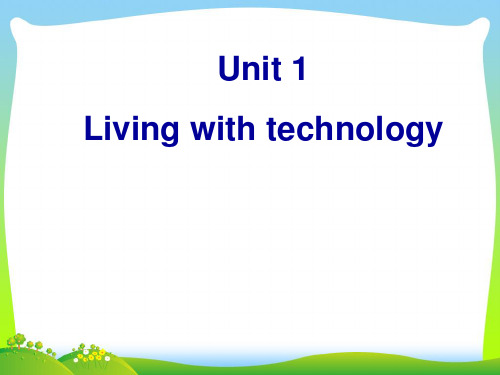牛津英语模块7unit 1 reading自创讲义
牛津高中英语模块7 第一单元welcome to the unit & Reading课件

Early TV was in black and white and had a poor picture.
Liquid-crystal-display televisions (LCD TV)
The development of computers
laptop desktop
The development of dictionary
Disadvantages:
1) Radiation may be harmful to people’s health. 2) When people buy new electrical or electronic devices, they throw away the old ones, which not only cause waste, but also are harmful to the environment.
F
T
T
3. Some of the first tape recorders used plastic tape to record on. 4. Records and cassettes do not offer as good a sound quality as CDs. 5. New technology will soon make many of the things talked about in the article out of date.
Think it over
Do you think these electrical and electronic devices (products) are very useful? Why?
Fast reading
牛津译林版英语七年级上册Unit1 Reading 课件

Look at the pictures, the title and the sub-headings on P3. Then tick (√) the things that you may find in Anna's blog.
1 her country
□√
2 her age
□√
3 her parents' names □
Now try to introduce yourself to your partner from these aspects.
•Name: •Country: •Age: •What you look like: •Family members: •Hobbies:
1.Hello, everyone.
are
4.aaTlhlhevaseepCorfp1yatyrfhDereiomewnyybdoolrfuyadn.vksiocniuenorwaiintteatdhlhiekcosibmn?bdeFieaisnn.idngs
a thoinugtsthIemcuosrtredcot answers. (P 4)
Read Para. 3 and 4 and answer the questions.
1.How does she go to school? She goes to school by school bus.
2.What are her favourite subjects? Maths, Art and Science.
5.What does “e-friend” mean to Hi? It means a friend from the Internet.
【通用】牛津高中英语模块七unit1_Reading.ppt

The development of electric devices:
colour TV
black-and-white TV
development of TV
LCD screen
desktop
Palm
development of computer
laptop
dictionary
development of dictionary
1.What can our human beings benefit from the development of electric and electronic appliances?
2.Can we depend on these appliances completely?
Summary
electronic dictionary
letter/telegram
telephone
development of
communication
beeper
cell phone
camera
digital camera
mobile phone with a camera
development of camera
washing machine TV (colour) air-condition mobile phone(with basic functions) mobile phone(with MP3 and camera)
What can you conclude from the timeline?
2.High technology has a direct effect on our life. What electric goods and electronic appliances(电器) do you have at home?
牛津译林版七年级英语上册Unit 7 Reading (I) 示范公开课教学课件

Pre-reading
While-reading
Post-reading
Warming-up
I only have 25 yuan. I want to buy some presents different from Amy’s. What can I buy?
5. Kitty can buy Simon _________.
Friends’ interests and hobbies are important.
Listen and read the conversations loudly.
Listen and read
Pre-reading
While-reading
Post-reading
Warming-up
Pre-reading
How can we become qualified (合格的) shopkeepers or rational (理性的) customers?
Pre-reading
While-reading
Post-reading
Warming-up
Think and discuss
Why does Amy buy football cards for Simon?
Read and analyze
How do we make a proper conversation when shopping?
While-reading
Pre-reading
Warming-up
Pre-reading
While-reading
Post-reading
Warming-up
Think and say
牛津译林版英语八年级上册Unit7Reading1说课稿

(3)教育学生学会与人为善,关爱他人。
(三)教学重难点
1.教学重点:
(1)生词的拼读和运用;
(2)一般过去时态、现在完成时态的理解和运用;
(3)阅读技巧的运用;
(4)根据上下文进行情景;
(2)阅读技巧的培养;
(3)在交际过程中,如何准确地运用所学语法和词汇。
3.学习兴趣:学生对生动有趣的故事和情境有较高的兴趣,对于英语学习,他们更倾向于通过实际应用来提升语言能力。
4.学习习惯:学生在学习上已经形成了一定的习惯,但可能存在学习方法不当、自主学习能力不足等问题。
(二)学习障碍
学生在学习本节课之前可能具备以下前置知识或技能:
1.前置知识:学生已经学习了一定的英语词汇和语法知识,能够进行基本的英语阅读和交流。
2.同伴评价:鼓励学生相互评价,分享彼此的学习经验和感悟;
3.教师反馈:我会根据学生在课堂上的表现和练习情况,给予针对性的反馈和建议,既肯定学生的进步,也指出需要改进的地方。
(五)作业布置
课后作业将包括以下内容,其目的是巩固课堂所学,并延伸学生的学习:
1.完成课后的练习题,包括词汇、语法和阅读理解练习;
(3)同伴教学:学生相互教授,分享学习心得和经验。通过这些互动方式,旨在促进学生积极参与,增强学生的合作意识和沟通能力。
四、教学过程设计
(一)导入新课
新课的导入方式将采用故事导入法,以一段关于Gulliver的有趣故事开头,通过动态图片或简短动画展示Gulliver在小人国的奇异经历,迅速吸引学生的注意力。紧接着,我会提出一些引导性的问题,如:“如果你到一个所有东西都特别小的国家,你会有什么感受?”这样的问题可以激发学生的想象力,并引导他们思考即将学习的内容。此外,我会利用学生的好奇心,提出一些悬念,如:“Gulliver在小人国会遇到什么奇妙的事情?”这样,学生会在期待中进入新课的学习,兴趣盎然。
牛津译林 模块七第一单元 M7U1 wel+reading (语言点).ppt

•电脑
• CD players
•CD播放器
• Mobile phones
•手机
• Digital camera
•数码相机
• Electronic dictionaries•电子词典
• Electric cookers
•电饭锅
Have a discussion
What do you think of this phenomenon? Can you give people some advice?
_E__a_rl_y_history of TV
TV
The m__o_d_e_r_n_ age : satellite TV,
(in order of_t_i_m_e__ )
Early history of_S_o_u_n_d__r_e_c_o_r_ders
Audio S_o_u_n__d_a_n_d__v_id__eo__r_e_c_o_rd__er_s___ devices _S_o_u_n_d__a_n_d_v_i_d_e_o_ go digital
作代词,=anything or everything that 任何的事 物/每一……的事物
He’d have difficulty in learning any language ——Greek, Chinese, or whatever.
作代词“or whatever” 或任何东西/ 诸如此类”
as a telephone / watch / calendar / Cell-phone camera / computer
Language points
Picture4: With mobile phones, we can keep in touch with others wherever we are.
译林牛津高中英语模块七 Unit1Reading PPT课堂课件(26页)
• throughout the countryside and the remote areas L22-23
• a small percentage of people L23
• benefit from satellite TV L24 • broadcast the signals L24-25 • made the first recording of a human voice L27 • used round tubes to record on L28-29 • used discs as alternative to tubes L30 • be wound up by hand L31 • Times surely have changed! L32 • employed steel tape to record on L35 • by the late 1960s L38-39
accessible (adj.) 1)easy to obtain or use 容易获得或使用
accessible to the need for an efficient health service that is accessible to all easily/readily accessible Computers should be made readily accessible to teachers and pupils.
译林牛津高中英语模块七 Unit1Reading PPT课堂课件(26页)-精品PPT课件
译林牛津高中英语模块七 Unit1Reading PPT课堂课件(26页)-精品PPT课件
2) a place, building, or object that is accessible is easy to reach or get into The island is only accessible by boat. There is a church which is easily accessible from my home. 3) someone who is accessible is easy to meet and talk to, even if they are very important or powerful I think that you'll find she's very accessible. 4) a book, poem, painting etc that is accessible is easy to understand and enjoy He wants his music to be accessible to everyone.
高中牛津英语模块七Unit1Reading
The evolution of video and sound devicesEarly history of TVThe first public TV broadcasts were made in the USA in ter,in 1928,the first long-distanceTV broadcast was made between the UK and the USA.Regular public broadcasting followed shortly afterwards,first beginning on 11 May 1928 in New York and on 20 August 1929 in London.Many different people contributed to the development of TV.Most early TV broadcasts were made using a system developed by John Logie Baird in the UK.However,his system was very primitiveand had many drawbacks.An American,Philo Farnsworth,made important breakthroughs in the development of TV in the late 1920s and early 1930s.Modern TVs use many of the principles first discovered by Farnsworth.John Logie Baird constructed the first colour TV in 1928,but it was not until 1938 that the firstcolour TV programme was broadcast.It took more than two decades,though,until 1951,for regular colour TV broadcasts to begin in the USA.Regular colour TV broadcasts were delayed in the UKuntil 1967.However,within a short time nearly all TV broadcasts were made in colour,and withinfive years more colour TVs than black-and-while TVs were being used.The modern age:satellite TVSatellite were used to broadcast TV beginning in 1962.Satellites allow TV to be broadcast live over vast distances,with everyone receiving the same broadcast at the same time.They also make TV accessible to people who live far away from cities,and satellite dishes can often be seen distributed throughout the countryside and remote areas.Of course,only a small percentage of people own satellite dishes.However,most people still benefit from satellite TV,as local TV companies broadcast the signals they get from satellite receivers to the population living nearby. Early history of sound recordersIt all began in 1877,when Thomas Edison made ths first recording of a human voice on his invention,the record player,Early record players used round tubes to record on.However,in 1887 Emile Berliner,a German living in the USA,invented a record player that used discs as alternativesto tubes,and so the modern record player was born.The first record players had to be wound up by hand and only played records that were two minutes long.Times surely have changed!Sound and video recordersIn 1928,the first tape recorders used to copy sound were in Germany.Most early recorders employed steel tape to record on,which made them heavy and difficult to use,or paper tape,which was easier to use but often broke.It was not until the early 1950s that most tape recorders began using plastic tape as they do today.Meanwhile,electrical components eventually bacame so small that,by the late 1960s,portable cassette players were developed,along with video recorders which were used by TV stations.By the late 1970s,video recorders small and cheap enough for home use were introduced.Sound and video go digitalIn 1982,the first CDs were made available.CDs are often used for storing and playing music bacause they have a much better sound quality than traditional records and cassettes.In 1993,the VCD was born,and in 1995,the DVD was invented.The DVD is now the standard for recordingand playing back video.The future With the development of digital technology,sound and video can now be stored on a PC,on the Internet,or using some form of portable storage.This will soon make records,cassette recorders,CDs,DVDs and even TVs things of the past.Technology is now changing faster than most people can keep pace with.Who can foresee what the future will bring?。
牛津高中英语模块七unit1-Reading
development of
audio(音响) device
2021/3/11
20
walkman
MP4
2021/3/11
CD player
MD MP3
21
electric fan
fan
air conditioner
development of fan
2021/3/11
22
Discussion:
2021/3/11
24
Homework
1.Read two passages on P106-107
2.Preview reading. 3. Unit Revision: Period 1.
2021/3/11
25
M7 Unit1 Living with technology
Lead-in:
Science and 1.t_e_c_h_n_o_l_o_g_yplays an important role in exploring the unknown fields and realizing the dreams of our ancestors(祖先).
2021/3/11
12
electric fan
2021/3/11
hair dryer
13
Timeline
1982 1984 1985 1986 1990 1997 2001 2004
electric fan TV(black-and-white)
refrigerator development
washing machine TV (colour) air-condition mobile phone(with basic functions) mobile phone(with MP3 and camera)
牛津译林版模块7unit1reading
Unit 1 Living with Technology导学案1自主导学【学习目标】1.To master important words and phrases in this unit.2.To recite important sentences in reading and apply sentences.【重难点】Ss may find it difficult to finish exercises.自主预习1.单词词性(词形)变化construct v.制造;修筑,建造→ n. 建筑;建设→ n. 建筑者,建造者→adj.建设性的,积极的accessible adj.可使用的;可接触到的;可到达的;易理解的→ n. (接近或进入某地的)方法;通路;(使用某物或接近某人的)机会或权利 v. 存取distribute v.使分布,分散;分发,分配;分销→ n. 分布;分配;分发adaptation n. 适应;改编本,改写本→ v. 改编,改写;适应casual adj.非正式的,随便的;漫不经心的,不经意的→ adv.随便地;漫不经心地suitable adj.合适的,适当的→ v.适合于;合(某人的)心意religious adj.宗教的,宗教信仰的;笃信宗教的,虔诚的→n. 宗教receiver n.无线电视接收机;听筒,受话器;接受者→ v.接受,收到eventually adv.最后,终于→ adj. 最后的oppose v.反对,抵制,阻挠;与……竞争→ adj.相反的;对面的;对立的translation n.翻译;转化→ v.翻译reject v.拒绝,拒收;不予考虑→ n.拒绝,摒弃,剔除物,<医>排斥自学检测v.(使)推迟,延迟 v.上发条;缠绕;蜿蜒,曲折v.预料,预见,预知 v.播放,转播;接转,转发v.浏览,粗略地读 v.投票,选举,表决 n.选票,选举,表决v.拨(电话号码),打电话 v.摆脱;去除;丢弃v.牺牲,献出 n.牺牲,舍弃,祭品evolution. n.drawback n.principle n.black-and-white adj.satellite dish n.percentage n.tube n.disc n.;(计算机) component n.portable adj.digital adj.storage n.(空间) patent n.skeptical adj.ample adj.insurance n.obvious adj.all-round adj.electronic adj.idiom n.gram n.(重量单位) dustbin n.battery n.Christian adj.(信奉)carriage n.refrigerator n.tight adj.stable adj.circumstance n.merely adv.typical adj.shallow adj.elegant adj.(物品);(人或其举止)valid adj.;(法律上)重要词组背诵keep in touch with和……保持联系contribute to ...为……作出贡献;导致benefit from受益于,从……中得到好处with the development of随着……发展over a long distance远距离face to face 面对面as well也be absorbed in专注于for some reason因某种原因for good measure额外rid ... of使……摆脱rather than而不是wind up上发条be accessible to可接近的;可使用的keep pace with跟上in particular特别地,尤其be suitable for适合……text messages短信in the late 1920s在二十世纪二十年代末focus on集中(注意力、精力等)合作探究Welcome to the unit & reading(Ps1-5)1.【教材原句】With mobile phones,we can others wherever we are.(P1)有了手机,无论我们在哪里都可以联系其他人。
- 1、下载文档前请自行甄别文档内容的完整性,平台不提供额外的编辑、内容补充、找答案等附加服务。
- 2、"仅部分预览"的文档,不可在线预览部分如存在完整性等问题,可反馈申请退款(可完整预览的文档不适用该条件!)。
- 3、如文档侵犯您的权益,请联系客服反馈,我们会尽快为您处理(人工客服工作时间:9:00-18:30)。
M7 U1 Reading
1. With mobile phones, we can ___________ others wherever we are. 不管我们身处何方都可通过手机和他人保持联系。
和…有(无)联系___________________
和…取得联系___________________
和…失去联系___________________
(1)我正在设法和简取得联系。
你有她的电话号码吗?
I’m trying to ____________Jane. Do you have her phone number?
(2)我与所有的老朋友都失去了联系。
I’ve _____________________all my old friends.
(3) We keep in touch ________ writing often.
A. with
B. of
C. on
D. by
2. evolution n. 进化;发展,演化(the gradual development)the theory of evolution evolve (from…) (into…)
The two species evolved from the same ancestor.
3. contribute to
(1) 为…作出贡献=_________________
(2)有助于,成为……的原因= lead to, result in
Regular exercise certainly contribute to good health.
(3) 投稿She contributes (articles) to several magazines.
4. drawback n. 弊端,缺点=
The main drawback of living downtown is the constant noise.
5. principle n. ___________; ____________
The experiment is based on this principle.
I refuse to lie to people; it is against my principles. ( )
He is a man who ______________________. (坚持原则)
6. delay vt.& n.耽搁,拖延,推迟
__________________推迟(做)某事
__________________毫不迟延地,立即
①The train was delayed (for) one hour due to the accident.
②Anxious about her health, he _____________her the matter.
由于担心她的身体,他没有马上告诉她这件事。
③Report it to our teacher________________.
赶快将此事报告老师。
(1) He delayed_____her the news, waiting for the right moment.
A. to tell
B. telling
C. to have told
D. having told
(2)他迟迟未回信。
He__________________the letter.
7. accessible adj._______________________________
be accessible to...可接近的;可使用的。
access n. (接近的)方法;通路;可接近性
have/get/obtain/gain access to...拥有…的机会;可以接近;进入give sb access to 接近;准许进入
①The island is accessible only by boat.
只有乘小船才能到达这座岛屿。
②Premier Wen is accessible to the whole people.
温总理让全国人们都感到平易近人。
(1)Frank put the medicine in a top drawer to make sure it would not be________to the kids.
A.accessible B.relative C.acceptable D.sensitive (2)学生必须有使用好图书馆的权利。
Students must ________________a good library.
(3)大众无法看到这些文件。
These documents are not________________the public. 8. distribute vt. _____________; _______________
The volunteers will_________ food and clothes ______ the victims in the flooded area.
This kind of butterfly is widely distributed all over the country.
A large percentage of the hotel’s income is from the visitors to the lake nearby.
那家旅馆的收入大部分来自于参观附近那个湖的游客。
“a percentage of+n.”作主语时,谓语动词的单复数与of后的名词保持一致。
10. record n. ________;_________;__________
play a record hold/ break the world record keep a record of the living expenses
vt. 记录,记载;录制
Her childhood is recorded in the diaries.
11. wind (________; _________) v. 上发条;缠绕;蜿蜒曲折
①Tom wound his clock (up) before he went to bed.
②He wound a bandage around the bleeding finger.
③The path wound down to the beach.
这条小路弯弯曲曲通向海滩。
The river winds its way to the sea. a long and winding road _____________1) 摇动(把手等);给机器上发条
2) 使(活动、会议等)结束3) 以……告终;落得个……下场It was one of those old gramophones that you have to wind up. It’s time to wind things up — I have a plane to catch.
You keep driving like that and you’ll wind up dead.
12._________________跟上某人的步伐
The father __________a bit so that the child could ________him. 父亲放慢了脚步,以便让孩子跟上他。
One should keep pace with the times.
I enjoy my job in research because I have to .
我喜欢我的研究工作,因为我得紧跟上所有的最新发展。
13. foresee ( ________; ________) vt. __________________ forecast foretell forehead
1. It was________he came back from Africa that year________he met the girl he would like to marry.
A. when;then
B. not;until
C. not until;that
D. only;when
2. It’s not what we do once in a while________shapes ou r lives,but what we do consistently.
A. which
B. that
C. how
D. when
3. —That must have been a long trip.
—Yeah,it________us a whole week to get there.
A. takes
B. has taken
C. took
D. was taking
4. You have no idea how she finished the relay race________her foot wounded so much.
A. for
B. when
C. with
D. while。
